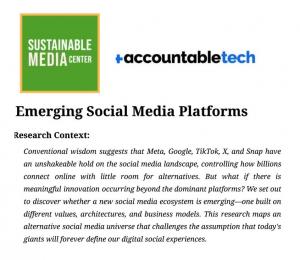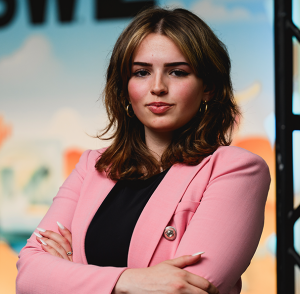A New Generation Demands Better: Groundbreaking Research Uncovers 150+ Ethical Alternatives to Mainstream Social Media
Gen Z researcher maps 150+ ethical, human-centered alternatives to Big Tech platforms—proving the future of social media is already here.
This report proves what young people have been saying for years: we deserve healthier spaces online. Kendall’s research shows the future of social media is already being built.”
NEW YORK, NY, UNITED STATES, November 3, 2025 /EINPresswire.com/ -- A new generation of internet users is rewriting the rules of online connection. As social media giants face mounting scrutiny over their effects on mental health, democracy, and civic trust, the Sustainable Media Center has released a landmark study showing that the next social internet is already emerging — and it looks nothing like Facebook, TikTok, or Instagram.— said Emma Lembke, Director of Gen Z Advocacy at SMC
The report, The Future of Social Media: There is Hope, produced in collaboration with the Sustainable Media Center (SMC) and Accountable Tech, maps a fast-growing ecosystem of more than 150 alternative platforms that are building a healthier, more ethical foundation for digital life. The study categorizes and analyzes 67 of these platforms in depth, tracking how decentralized networks, minimalist apps, and community-driven spaces are reclaiming what social media was supposed to be: social.
Responding to the report, Emma Lembke, Director of Gen Z Advocacy at the Sustainable Media Center, said: “This report proves what young people have been saying for years: we deserve healthier spaces online. The research shows the future of social media is already being built — platforms that put human connection, creativity, and well-being first. Now it’s up to policymakers, educators, and parents to take these alternatives seriously and support them.”
“We’ve been told social media is broken, but that’s not the full story,” said research partner Kendall Schrohe. “There’s a growing movement of developers, activists, and everyday users who are building alternatives — spaces that prioritize privacy, authenticity, and human-centered design. My research shows the future is already here. We just have to support it.”
A Different Kind of Social Internet
The research challenges the belief that Meta, Google, TikTok, X, and Snap have an unshakable grip on the digital landscape. Her findings reveal an emerging ecosystem of innovation defined by ethical design, decentralized infrastructure, and new business models that reject surveillance-based advertising.
The report finds:
- A sweeping shift away from algorithm-driven feeds toward chronological, ad-free, and minimalist designs
- A rise in niche platforms tailored to specific communities — from neurodivergent users and LGBTQ+ creators to outdoor explorers, artists, and book lovers
- A new wave of apps using technology to facilitate real-world friendships, intentional sharing, and ethical monetization
- Case studies of ten standout platforms personally tested by Schrohe, including the post-limited network Minus, the decentralized messaging platform Pools, and the recommendation app Perfectly Imperfect
Unlike traditional social media that thrives on surveillance capitalism, many of these platforms operate through subscriptions, grants, crowdfunding, or creative revenue models — proving that connection doesn’t have to come at the cost of data or well-being.
Mapping the Alternatives
To make the landscape easier for policymakers, funders, and educators to navigate, the report groups alternative platforms into key categories:
- Fediverse platforms (Mastodon, Pixelfed, Peertube, Mobilizon) using open protocols like ActivityPub
- Decentralized and ethical platforms (Bluesky, Vero, MeWe, Sparkable, Pools) emphasizing user control and non-advertising models
- Healthier social media (Retro, Minus, Foto, Cosmos, Joinable, Mozi) that reduce addictive patterns
Inclusive and community-first platforms (Diem, Spoony, Lex, Communia, Sunroom) designed for users who were underserved or unsafe on legacy networks
Child-safe platforms (Zigazoo, Coverstar) that prove social media for kids can be positive, moderated, and ad-free
The report calls this growing space an “alternative social media universe” — one that values privacy, authenticity, and connection over engagement and data extraction.
Why It Matters Now
The release comes as lawmakers and educators debate how to regulate Big Tech and as parents seek real alternatives, not just warnings. Schrohe’s work gives them a roadmap.
“Policy will not succeed if we tell young people what to leave without telling them where to go,” said Steven Rosenbaum, Executive Director of the Sustainable Media Center. “Kendall’s work shows there is somewhere to go.”
About the Report
The Future of Social Media: There is Hope is based on a six-month research initiative that identified 135 emerging platforms and analyzed 67 of them in depth. Platforms were evaluated by architecture, business model, design goals, and audience. The report also recommends further research on user retention in decentralized systems, mental health impacts of healthier-by-design apps, and policy supports for platform diversity.
The full report and complete platform list are available at SustainableMedia.Center/Research
About the Sustainable Media Center
The Sustainable Media Center (SMC) is a nonprofit think-and-do tank focused on reimagining a healthier, more sustainable information ecosystem. By convening journalists, technologists, researchers, and creators, SMC advances new models for trustworthy media, equitable platforms, and a digital environment that supports democracy and human well-being. Learn more at sustainablemedia.center
.
About Accountable Tech
Accountable Tech was a nonprofit advocacy organization that worked to curb the harms of Big Tech and promote a safer, more ethical digital future. Before concluding its operations in 2025, Accountable Tech played a pivotal role in supporting research, public awareness, and policy reform aimed at creating a more humane digital ecosystem. Its legacy continues through the efforts of partner organizations and emerging movements for platform accountability.
.
Emma Lembke
SustainableMedia.Center
email us here
Sustainable Media Center
Legal Disclaimer:
EIN Presswire provides this news content "as is" without warranty of any kind. We do not accept any responsibility or liability for the accuracy, content, images, videos, licenses, completeness, legality, or reliability of the information contained in this article. If you have any complaints or copyright issues related to this article, kindly contact the author above.


